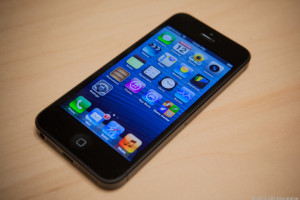In case you missed it, Apple announced the release of the iPhone 5 on Wednesday. Though the die-hard fans will have begun to salivate as soon as the press conference began, most of the rest of the world just uttered a collective, “Yup.” So much information had been leaked out ahead of time that nothing in the announcement was a great surprise.
There has been talk about how the new plug will require users of the new device to purchase a $30 adapter (on which the margin will be huge) to make it work with other Apple products, but otherwise, there hasn’t been the hype that came with earlier iPhone announcements. In spite of the general ennui over this unveiling, millions of the iPhone 5 smartphones are expected to sell, and quickly.
I will admit to being the happy owner of an iPhone 4. And as one friend of mine tweeted the other day, Apple’s most recent announcement means that  the phones he and I use will now be the “freebies” given away by the cell phone companies to entice users to sign up for a new contract. Does that discourage me? Hardly. For something the phone company will give away for “free” (notice the quotation marks there), what I use is still a pretty fantastic and eminently useful device that makes my day-to-day working life easier.
the phones he and I use will now be the “freebies” given away by the cell phone companies to entice users to sign up for a new contract. Does that discourage me? Hardly. For something the phone company will give away for “free” (notice the quotation marks there), what I use is still a pretty fantastic and eminently useful device that makes my day-to-day working life easier.
So, am I “encouraging” you to get an iPhone? Not really, though if you need a flag-waver for it, count me in. No, I’m just using this to illustrate that even hyped up technology can be met with a ho-hum response. The announcement of the iPhone 4, and even the 4S, brought more media and ground-level buzz than this proclamation did. And frankly, Apple probably isn’t disappointed, because they know that their loyal fan base will still be putting megadollars into Apple’s bank account once the phone releases in Canada next week. They’re not worried.
There was a lot of initial ‘buzz’ when Jesus showed up on the scene in first-century Palestine. People saw his miracles and heard his teaching and asked each other, “Could this be the Christ?” (John 4.29b [NIV], e.g.). But later, these same excited people crucified him, in part, because he did not meet their expectations of what the Messiah should be.
It’s not likely that people are going to try out their new iPhones and then run over them with their cars because it doesn’t meet their expectations. Why? Because Apple understands what its consumers want, and it delivers. The difference is that while God knew what the people needed in giving his only Son, the people didn’t necessarily see it that way.
God is not a “give ‘em what they want” kind of deity. God is a “give ‘em what they need” God. And Jesus is not a consumer commodity. There are landfills around the world that testify to the throwaway nature of consumer commodities. Jesus, on the other hand, was crucified at the Jerusalem landfill site because what the people needed what not what the people wanted.
Thank the Lord that God has given us not what we want, but what we need.

